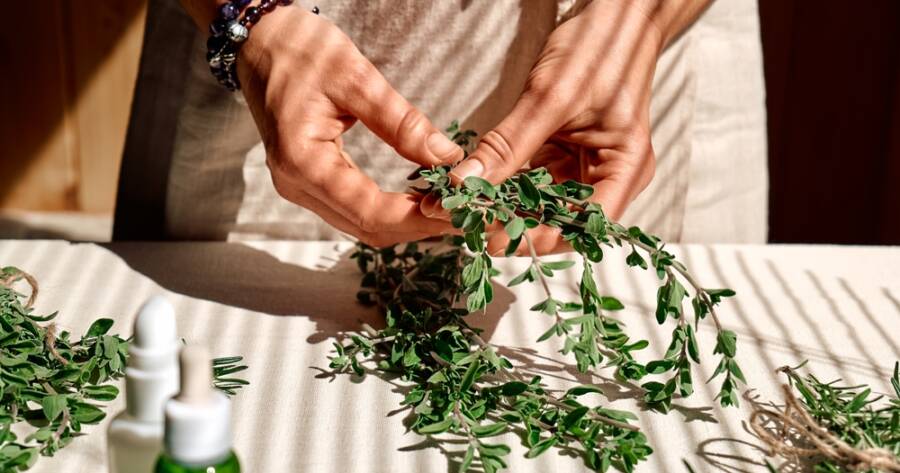Are you passionate about exploring the power of plants and natural remedies? Becoming a certified herbalist might be the perfect path for you. Start a search today to find the best herbalist certification courses — some of them might even be free!
What Is a Herbalist?
Herbalists are experts in the use of plants and herbs for healing and maintaining health. They draw on traditional knowledge, modern research, and holistic approaches to address various health issues. These practitioners create herbal remedies, teas, tinctures, and salves, often personalized to individual needs.
Herbalists may focus on specific areas like traditional Chinese medicine, Ayurveda, or Western herbalism, depending on their interests and training. They work closely with nature, harnessing the power of plants to promote well-being and alleviate ailments.
Career Opportunities
Becoming a certified herbalist opens up a world of diverse career opportunities. Here are some of the paths you can explore:
- Clinical Herbalist: Clinical herbalists work one-on-one with clients, assessing their health and crafting customized herbal remedies. They often operate in private practices or wellness centers, helping people with a wide range of health concerns.
- Botanical Product Development: If you’re passionate about creating herbal products, this path allows you to formulate and market your own line of herbal teas, skin care products, or supplements.
- Herbal Educator: Herbalists can become educators, teaching others about the wonders of herbalism. This could include offering workshops, online courses, or writing books and articles.
- Herbal Farming: Some herbalists choose to cultivate their own herbs and plants, supplying ingredients for their products or selling them to herbal product manufacturers.
- Research and Consulting: Herbalists with strong research skills can work in research institutions, helping advance the field of herbal medicine or consulting with healthcare professionals.
- Holistic Health Practitioner: Herbalists can complement other holistic health practices, such as acupuncture, chiropractic care, or massage therapy, to provide well-rounded care to patients.
Salary Expectations for Herbalists
When it comes to the salary of an herbalist, the American Herbalists Guild emphasizes the wide spectrum of potential earnings in this field. Herbalists can earn anywhere between $20,000 and $120,000 per year, which is influenced by various factors. These factors include the specific area of herbal practice, individual successes in the field, the chosen career path, the skill set possessed, the frequency of work, and geographical location. As a herbalist, your income will depend on a combination of these elements, making herbalism a versatile profession that accommodates a range of financial goals and lifestyle choices.
How to Become a Herbalist
Becoming an herbalist is a unique journey, distinct from the conventional path of medical professionals. Unlike doctors who attend medical school, herbalists follow a diverse and flexible route to achieve their expertise. Here’s a breakdown of the steps and considerations to embark on the herbalist’s path:
Diverse Training and Certification Landscape
There isn’t a one-size-fits-all training or certification program for herbalists. Instead, herbalism offers a variety of educational routes that cater to individual preferences and goals. Some key options include:
- Graduate-Level Programs: Several institutions offer graduate-level programs in clinical herbal medicine. In these programs, students are encouraged to blend evidence-based science with traditional herbal practices. This approach provides a solid foundation in both modern scientific principles and the wisdom of herbal traditions.
- Membership and Certification: Organizations such as the American Herbalist Guild (AHG) play a pivotal role in the herbalist community. The AHG offers memberships and certifications to aspiring herbalists. To attain the title of Registered Herbalist through the AHG, individuals typically need to complete approximately 400 hours of training and clinical experience.
Herbalists also have the flexibility to tailor their education to align with their passions and interests. Many herbalists choose to complement formal education with the following:
- Clinical Mentorships: Learning from experienced practitioners through mentorship programs provides real-world insights and invaluable guidance.
- Real-Life Experiences: Herbalists often gain practical experience by working directly with clients, which deepens their understanding of herbal applications and fosters confidence in their practice.
- Intensive Self-Study: Self-directed learning plays a significant role in an herbalist’s education. Herbalists engage in rigorous self-study to expand their knowledge and expertise continuously.
- Workshops, Webinars, and Conferences: Attending events specific to their field of interest allows herbalists to network, learn from experts, and stay abreast of emerging trends and practices in herbal medicine.
Free Learning Opportunities
Don’t overlook the wealth of affordable and even free herbalism courses available on online learning platforms like Coursera and Udemy. These platforms offer courses covering various aspects of herbalism, from introductory lessons to in-depth studies.
While some courses may have a modest fee, many provide essential foundational knowledge without a significant financial burden. This accessibility makes them an excellent choice for those seeking to explore herbalism on a budget.
Start Your Search Today
The journey to becoming a certified herbalist is both exciting and rewarding. Whether you’re drawn to clinical practice, product development, or educating others about the wonders of herbalism, there are numerous career paths to explore.
Start your search today by researching educational programs, connecting with experienced herbalists, and diving into the wealth of free resources available online. The world of herbalism awaits, and your green journey begins with a single step.
